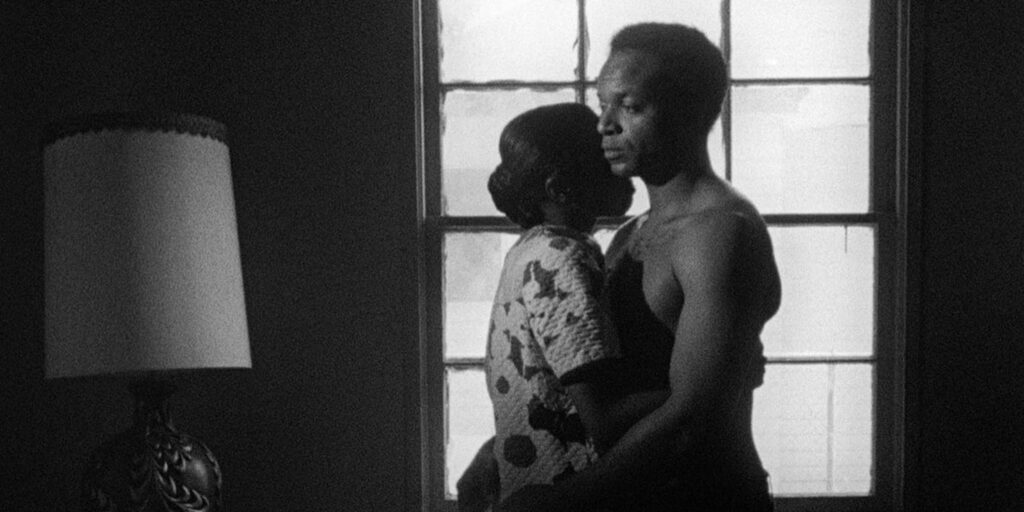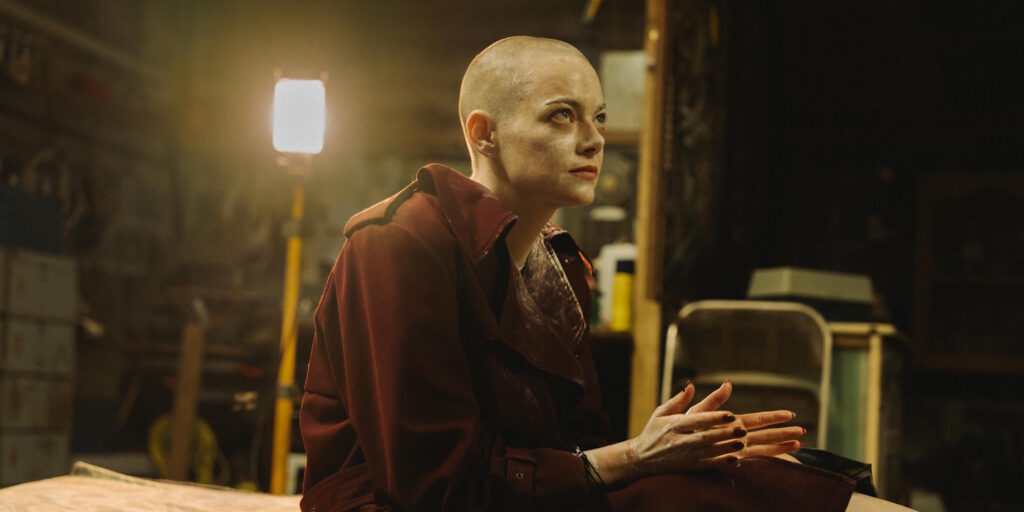When we first meet sad-sack sheriff Joe Cross (Joaquin Phoenix), he’s sitting in his marked SUV out in the middle of the desert, watching a YouTube video about strategies for convincing your spouse to conceive a child. The date is late May 2020 and the place is the middle-of-nowhere, dead-horse town of Eddington, N.M. Tribal police from the nearby Pueblo reservation abruptly pull up alongside Joe, sharply remarking that he is idling on their side of the border and therefore needs to put on an anti-Covid mask. Joe, visibly exasperated, points out that he is both asthmatic and alone in his vehicle with the windows up – and furthermore, one of the tribal officers isn’t even wearing his own face covering correctly. Eventually the sheriff relents and masks up, only to slip it off the second the Pueblo are out of sight.
It’s a drolly familiar but tense exchange, likely to evoke none-too-fond memories of early 2020 in viewers. It also reveals how writer-director Ari Aster apprehends the Covid-19 pandemic’s role in perhaps irreparably breaking America’s collective brain. Of course, the jurisdictional dick-measuring and racial animosity that simmers underneath Joe’s mask squabble with the Pueblo existed long before the coronavirus stumbled into town. Like the proverbial mysterious, trouble-inciting drifter in black, however, a public crisis has a habit of widening existing fissures in a community. In Aster’s conception, U.S. society teeters on an especially unstable foundation, spiderwebbed by political and cultural cracks that easily shift under the influence of online brain rot, malicious provocation, and good old American idiocy.
Over five years since the Covid-19 first descended on the globe, Aster’s obsessively detailed, mutinously unclassifiable, and often exasperating fourth feature Eddington feels like the first post-pandemic pandemic film that truly attempts to grapple with the virus’ cultural impact. (Not that the coronavirus ever went away …) Whereas most Covid films have used the pandemic as a source of insipid comedy, plot contrivance, or superficial scene-setting, Eddington is something stickier and more ambitious: a bloody, blackly comic neo-Western that satirically tackles the bubbling tar pit of Trump’s America v1.0 head-on. Yet Aster’s feature feels less like a hyper-specific period piece and more like a microcosm in continuity with our current crapsack timeline. Maybe this is by cheekily deliberate design. Or maybe it’s just attributable to the liminal, bad-dream quality of life in these United States, in which May 2020 feels simultaneously like it was just yesterday and a million fucking years ago. The dumpster fire rages on.
Eddington personifies Covid-19 as a disheveled, barefoot derelict named Lodge (Clifton Collins Jr., unrecognizable) who wanders into town one night, spewing hateful ramblings from snot-sticky lips. Joe ends up tussling awkwardly (and inconclusively) with this mentally unstable man in the town’s only bar – an incident that will later come back to haunt the sheriff in more ways than one. However, this vagrant is less an inciting spark than a one-man Greek chorus, his nonsensical ravings serving as a fitting commentary on the madness that is about to engulf the town. Not that Eddington seems particularly on edge, at least at first. Indeed, it doesn’t seem particularly anything, just a few square blocks of empty streets and vacant storefronts, an anonymous ghost town where the buzzing streetlights illuminate nothing. Characters are quick to blame the recent state-mandated lockdowns for Eddington’s woes, but like so many small American towns, economic rigor mortis settled in years ago.
The aforementioned bar happens to be owned by the town’s slick, Patagonia-clad mayor, Ted Garcia (Pedro Pascal), who has a history of animosity with the sheriff, some of it sordidly personal in nature. Garcia is earnest and likeable, but gives off a whiff of self-interested, neoliberal phoniness, particularly when he’s railroading the town council via Zoom about his pet high-tech business-development project. (Christened, in one of the feature’s many absurdly online visual gags, “solidgoldmagikarp,” all lowercase.) The sheriff’s antipathy for the mayor boils over during a confrontation about masking requirements in the town grocery store, leading to an impulsive decision on Joe’s part: He resolves to unseat Ted as mayor, running on an explicitly anti-mask platform. He makes this announcement via a breathless rant filmed from the front seat of his vehicle and posted on social media. Because of course he does.
Aster and Phoenix walk a tricky line with their characterization of Joe, who is the story’s protagonist and point of audience identification but also a dim-witted reactionary whose behavior only grows more violent and despicable as the film goes on. Although Eddington refrains from mentioning American political parties by name, Joe is plainly MAGA-coded: In addition to being an anti-masker, he covers his official vehicle in signs spouting conspiracy theories and vacuous, confusing slogans with a veneer of anti-authoritarianism. (A hand-drawn campaign flowchart connects Mayor Ted to nefarious, microchip-injecting mastermind Bill Gates.) When George Floyd’s murder at the hands of Minneapolis law enforcement results in nationwide anti-police protests, Joe mumbles about paid crisis actors and media complicity, egged on by his redneck deputy, Guy (Luke Grimes). Pointedly, his other deputy, a Black straight-arrow lawman named Michael (Michael Ward), mostly stews in silence.
Yet Eddington also heads off any possibility that Joe might be misconstrued as a heroic avatar for white male grievance, a la William “D-FENS” Foster in Falling Down (1993) or Tyler Durden in Fight Club (1999). It achieves this by consistently portraying the sheriff as a bungling clown. Excruciatingly ineffectual as a law-enforcement officer, Joe is woefully unqualified in terms of both political savvy and general temperament to handle the multi-dimensional clusterfuck that kicks off once the town’s would-be activists take up the Black Lives Matter cause. Never mind that most of the protesters that materialize in Eddington’s formerly deserted streets seem to be teenagers incoherently shrieking just-learned anti-racist buzzwords for Internet clout – or, in the case of Ted’s son, Eric (Matt Gomez Hidaka), and his friend Brian (Cameron Mann), for the chance to ingratiate themselves to hot leftist girls. To Sheriff Joe’s scattered brain, addled by a drip-feed of alt-right doomscrolling and a possible viral infection, they all look like Soros-backed antifa terrorists.
Which isn’t to say that the film’s portrayal of Joe is entirely unsympathetic. His relationship with his wife, Louise (Emma Stone), is distant and fraught, but not due to his own toxic masculinity, as one might initially expect. Indeed, Joe is patient and gentle with Louise, who suffers from some unspecified and undiagnosed mental illness, obsessively channeling her unresolved childhood traumas into bizarre, off-putting handicrafts. It doesn’t help that Louise’s mother, Dawn (Deirdre O’Connell), is currently living with the couple: a snippy, passive-aggressive Covid-truther, Dawn has begun to infect her daughter with her conspiratorial rants. Yet even this corkscrews off in an unexpected direction, as Louis drifts away from her mom and into the clutches of a QAnon-style cult figure named Vernon (Austin Butler, hypnotically menacing), a Charles Manson-meets-Alex Jones svengali with a California surfer cut and a disarming space-cadet manner. Joe is so ineffectual that he’s essentially a hapless bystander to this slow-motion domestic disaster, naively believing that a romantic, home-cooked meal will cure whatever ails Louise.
Joe makes so many terrible decisions over the course of Eddington that it’s difficult to say exactly when he trips over the line from frustrated but broadly well-meaning moron to outright villain. There are more spectacularly violent and erratic inflection points, certainly, but there’s something especially venal about the sheriff’s impulsive choice to leverage Louise’s troubled past as a political weapon against Mayor Ted. It’s a strategy that backfires almost immediately, and Joe quickly spirals into a dark place after his appalled wife flees into Vernon’s waiting arms. The final act of Eddington plays like a dusty, gonzo riff on Fargo (1996), with Joe filling the Jerry Lundegaard role and Pueblo tribal officer Jiminez Butterfly (William Belleau) as his dogged Marge Gunderson. Of course, Fargo’s climax didn’t involve an extended, run-and-gun firefight with masked antifa terrorists. The late-film appearance of these black-clad boogeymen – dropped into Eddington via private plane for some inscrutable global-elite purpose straight out of a right-wing subreddit fever dream – is the kind of baffling twist that veers dangerously close to South Park-level satire. (Or, at minimum, an Under the Silver Lake-style big swing.)
As a filmmaker, Aster has always expressed a psychopathologist’s fascination with the subjective experiences of his protagonists, whether they are oblivious innocents being puppeteered by a malevolent cult or a man fleeing like a panicked rabbit from his profoundly twisted childhood anxieties. However, despite this propensity for ushering viewers into his characters’ unreliable headspaces, Aster never treats storytelling as a winking confidence game. Whether his characters’ perceptions are being manipulated by demonic magic, hallucinogenic drugs, mental illness, or workaday gaslighting, the viewer is always keenly aware that the underlying reality is slightly (or severely) askew. Aster isn’t trying to trick us: Rather, he wants us to watch in impotent horror as his characters are tricked, despite all the glaring red flags.
What sets Eddington apart from Aster’s other features, then, is the sensation that this misalignment extends beyond Sheriff Joe’s own cold-sweat viewpoint, reflecting an entire American experience that has slipped off its axis. One can discern this systemic breakdown of the sociocultural order in virtually every subplot of Eddington, from the way that righteous anger over child predators is cynically funneled into exploitative alt-right rabbit holes to the way that TikTok has repackaged (and commodified) Tumblr identity politics for an attention-deficient Gen Z audience. Aster isn’t the first observer to venture that the social isolation of anti-Covid measures accelerated the siloing of Americans’ waking lives into ever more insular and reality-divorced subcultures, but he might be the first to embed the thesis inside such a weird, entertaining, and meticulously constructed work of artistic provocation. This isn’t to say that Eddington is peddling anything so simplistic as a “Both Sides Are Bad” cynicism, but Aster does posit that all politically charged memes – from stolen-land declarations to PizzaGate delusions – penetrate beyond the academic circles and niche communities that birth them via the same corrosive digital mechanisms.
Whatever one’s political or cultural takeaway from Eddington – and one could glean many, potentially conflicting messages from this strange, audacious feature – it’s one of the most formally accomplished films that Aster has made to date. The photography by the great Iranian-French cinematographer Darius Khondji (Se7en, Amour) is characteristically excellent, particularly in the Hopper-esque night sequences set amid the town’s lonely streets, which fittingly recall the best bits from Roger Deakins’ lensing of No Country for Old Men (2007). Composers Bobby Krlic (Midsommar) and Daniel Pemberton (Across the Spider-Verse) create a stressed, serpentine score that sporadically burbles and bursts, matching the gnawing tension and abrupt violence of the film’s events. Aster’s regular film editor Lucian Johnston and sound editor Nicholas Schenck deserve particular accolades, the latter pivoting off the former’s stellar, razor-sharp work to create some truly delicious audiovisual poetry (and morbidly hilarious jokes).
In fairness, not everything in Eddington works. Aster is more interested in phenomena than particulars, and his handling of the story’s intersecting, incendiary political topics – from BLM and police brutality to anti-government “plandemic” conspiracies – is often inelegant, favoring soundbites over substance. (Then again, maybe this is just art imitating life.) Dropping literal antifa false-flaggers into the story is a choice, as they say, and the feature is often similarly caught between its sincere desire to portray America’s internet-stoked paranoia as ludicrous and its anarchic impulse to unleash those delusional fears in the flesh. Indeed, Aster’s satirical approach at times feels like he’s reaching into a bin labeled “2020” and throwing anything he finds at the wall. (Bitcoin! Toilet-paper hoarding! White-guilt self-flagellation!)
Yet the precision of some of the time-capsule details evinces an unexpected cultural shrewdness: Mayor Ted blasting the 2010 Katy Perry hit “Firework” at his fundraising event feels exactly like the sort of thing a middle-age corporate Democrat would do in 2020. It’s these subtler touches that leave the strongest impression, whether the grammatical errors on Sheriff Joe’s slapdash campaign signs, or the fact that half the citizens in Eddington seem to be wearing their face masks under their noses. Indeed, almost every aspect of the film’s impressive, immersive texture – assisted by Bones and All (2022) production designer Elliott Hostetter – contributes to its feverish depiction of a derailed and out-of-control America. “Don’t make me think, post it,” Joe orders Guy at one point regarding a hasty social-media video, which feels like the motto for our present age of omni-directional madness.
Eddington opens in select theaters on Friday, Jul. 18.





One Response
I actually missed the beginning of this film and hope to re-watch it, so my comments here are provisional; but I’ve seen several reviewers indicate that the black-garbed assassin was probably Antifa and/or that Joe’s initial stage-setting attempt following his murder of the Garcias was intended to throw blame on Antifa. I did not read the film that way.
For one thing, reviewers don’t seemed to have picked up on Sarah’s reference to “Black Bloc” during the scene in which Joe tried to talk with the protesters.
During protests beginning at least as far back as Occupy Wall St., left-leaning protesters have complained of Black Bloc actors and agents provocateurs who allegedly took advantage of otherwise peaceful protests to try to push people toward violence or otherwise further an agenda that was inconsistent with or even contrary to that of the protesters. (Genuine) progressives have variously suspected such actors to be everything from government infiltrators (a tactic known to have been used frequently through the years by the FBI) to Anarchist/Accelerationist extremists to random, opportunistic troublemakers or looters to, in some cases, authentic Antifa; while right-leaning media have generally attributed any & all violence to Antifa or the protesters themselves.
From my viewing – unless I missed something – it wasn’t clear to me that Joe’s stage-set was aimed at Antifa per se. The message he spray-painted was simply “No Justice No Peace,” a chant that’s probably been used at everything from the Women’s March to labor strikes and certainly including ordinary BLM protests. So I read his message as a hasty attempt to throw suspicion on the BLM protesters in general. Alternatively, especially if he witnessed Sarah’s impassioned plea to Michael that he should join the protesters (I can’t recall whether the film showed Joe watching this), Joe’s message may have been the perhaps not-fully-conscious beginning of his plan to frame Michael, knowing as he did that Guy and other racists in town would support that interpretation.
As for the nature of the assassin, I thought the film portrayed quite brilliantly how uncertain “reality” really was on that point as on so many others.
Each character struggles to make sense of what’s happening, but in nearly all cases, their interpretations are driven in part by their own conscious or unconscious emotions and desires; and none have the whole picture. Their main hope of getting at the reality might have lain in sharing their info and impressions, and ideally that might have happened online; but social media owners have their own agendas and, among other things, operated to promote some stories, demote others, and above all to exacerbate bubble-ization and foster division.
So a lot of what’s happening in the film is people, perhaps especially Joe, trying unsuccessfully to engage others IRL communication – but various screens, glasses, and other surfaces that reflect as much or more about the viewer than the world kept getting in the way (cf. the broken windows).
So I’m doubt we’re supposed to be sure who hired the assassin.
All of that said, when in doubt, I usually find “follow the money” helpful; so I can’t resist speculating that the assassin was hired by whatever deep-pocketed interests hoped to benefit financially from the Solidgoldmagikarp development, and saw an opportunity to exploit the unfolding crises in a more or less classic “Disaster Capitalism” move. Who else would have pockets deep enough and also care enough about what happened in this tiny town?
I also think Vernon’s repeated refrain, “all this is not a coincidence” is meant by Aster ambiguously/ironically to be both untrue and true. Vernon is clearly exploiting important concerns about pedophilia, which is doubtless much more widespread than once believed; but there have also been cases of false claims, e.g., therapists using hypnosis and eliciting false memories. Vernon seems like just the guy to ignore what really did or didn’t happen or even encourage false memories in order to fuel his ascent.
What may not be a “coincidence,” however, is the ways in which social media and the like exacerbated “all this,” including the polarization around a variety of subjects; for so long as we remain divided, we’re unable to communicate effectively with one another and collectively organize so as to get a more complete understanding of what might really be going on and more effectively fight whatever powerful interests may be profiting from our misery.
All of that said, as I understand, the term “Solidgoldmagikarp” actually refers to a seemingly rather random phenomenon in AI programming – basically, a sort of glitch – in which certain “tokens” elicit “disasterously insane” responses. Which suggests to me that even if certain interests are covertly exploiting their power over our interpretations, their own understandings and efforts to control reality may, like ours, be imperfect.